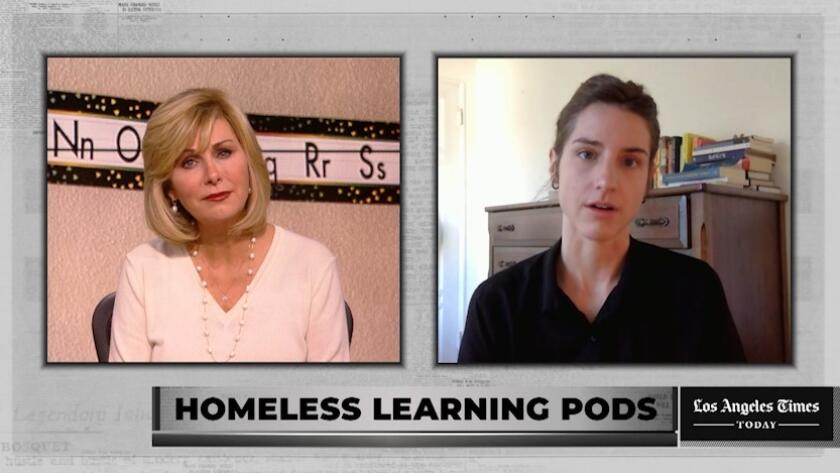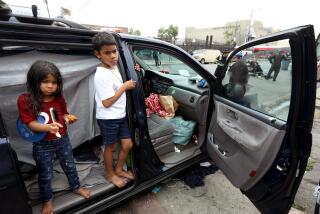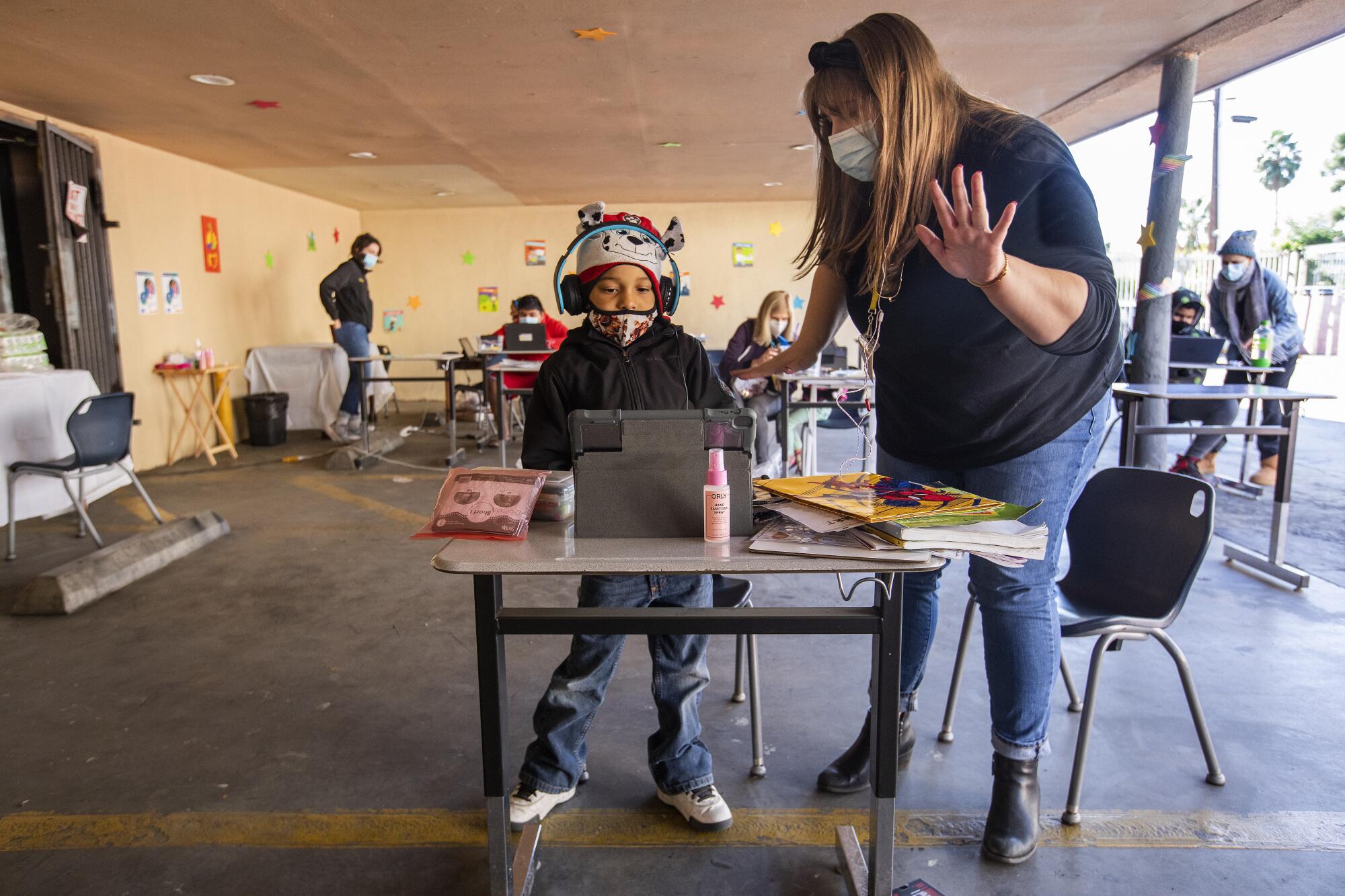
- Share via
A dozen bleary-eyed children bundled in sweaters, jackets and knit caps trickle into the motel carport, taking seats at metal desks evenly spaced atop the gasoline-stained concrete. Diagrams of the alphabet and solar system are taped to the beige stucco wall.
“How are we feeling today?” a tutor asks two little boys as they take their seats. “Sleepy?”
The younger boy nods yes as he pulls a blue mask decorated with Dalmatians over his face. A 4-year-old wearing socks, flip-flops and a hot-pink Minnie Mouse coat bounds over to her desk and plops into her chair.
The school day is about to begin for these children, who amid the COVID-19 pandemic are sheltering with their families at the Hyland Motel in Van Nuys. Every Monday and Tuesday since mid-August, these homeless students — as few as five or as many as 12 — have congregated in the carport, where volunteers help them navigate hours-long Zoom classes.
They are just a fraction of the L.A. Unified School District’s estimated 11,000 homeless students, who, according to data, are especially vulnerable to the pandemic’s learning impacts: lower grades, attendance rates and online participation.
Coronavirus-forced school closures didn’t just impact their education. It severed their day-long connection to food and shelter. LAUSD recently has ramped up efforts to reach more students, offering virtual healthcare and counseling and assigning staff to track down absent kids.
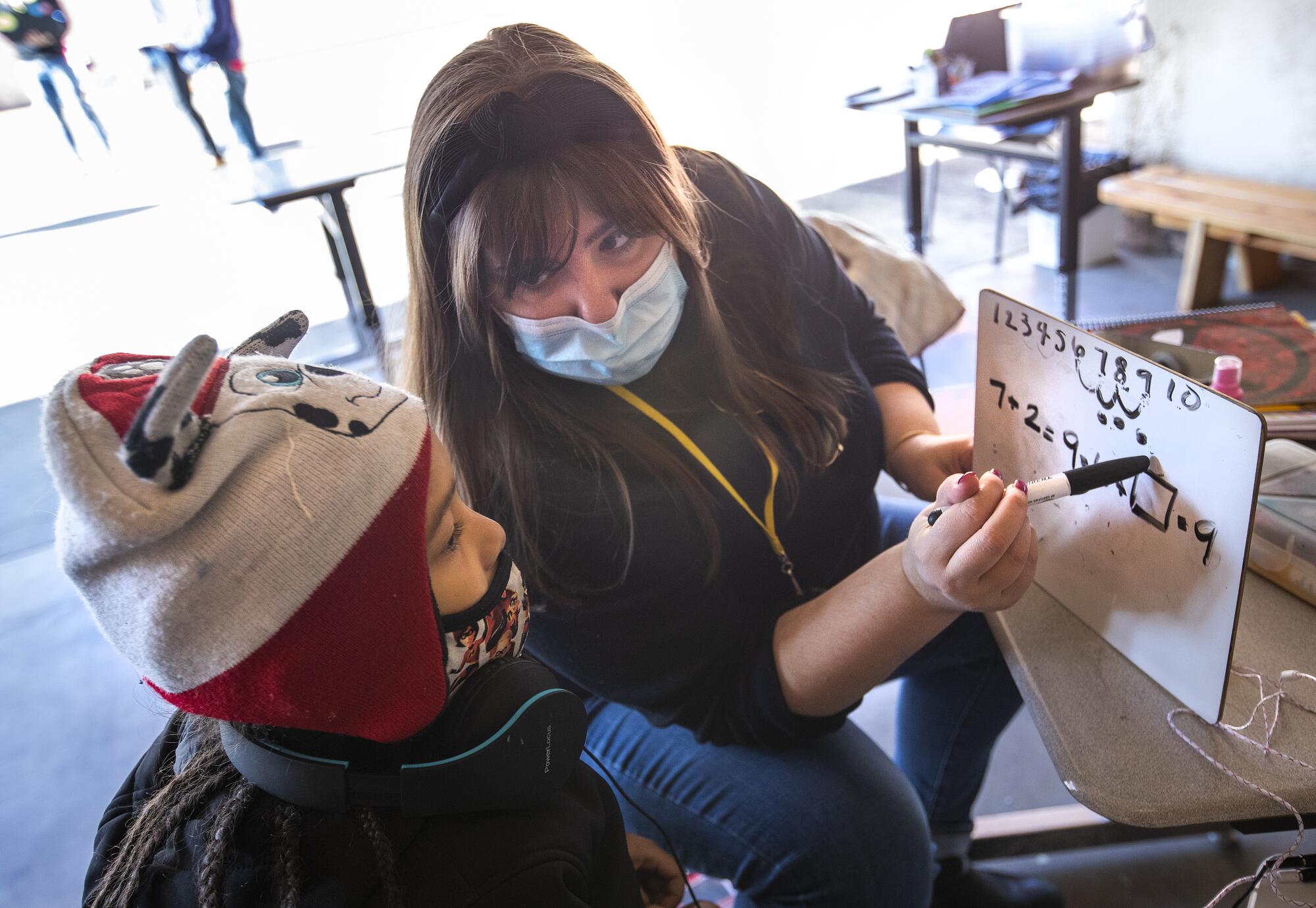
“Quite a few of our students hadn’t been logging into school at all until they came to our pod,” said Emma Gerch, a coordinator with School on Wheels, the nonprofit that has provided volunteer tutors. “If those students are able to log on and pay attention, that’s a win.”
At the Hyland, they take a page from more affluent district parents, who have pooled resources to hire teachers or tutors and set up well-equipped backyard classrooms to accommodate the challenges of distance learning.
The effort is part of a city-funded $770,000 pilot program called Kids First, dreamed up by City Councilwoman Nury Martinez and launched in August to help homeless families and children secure healthcare, tutoring and permanent housing.
“Once COVID hit in March, we knew the situation for these families just got so much worse,” Martinez said.
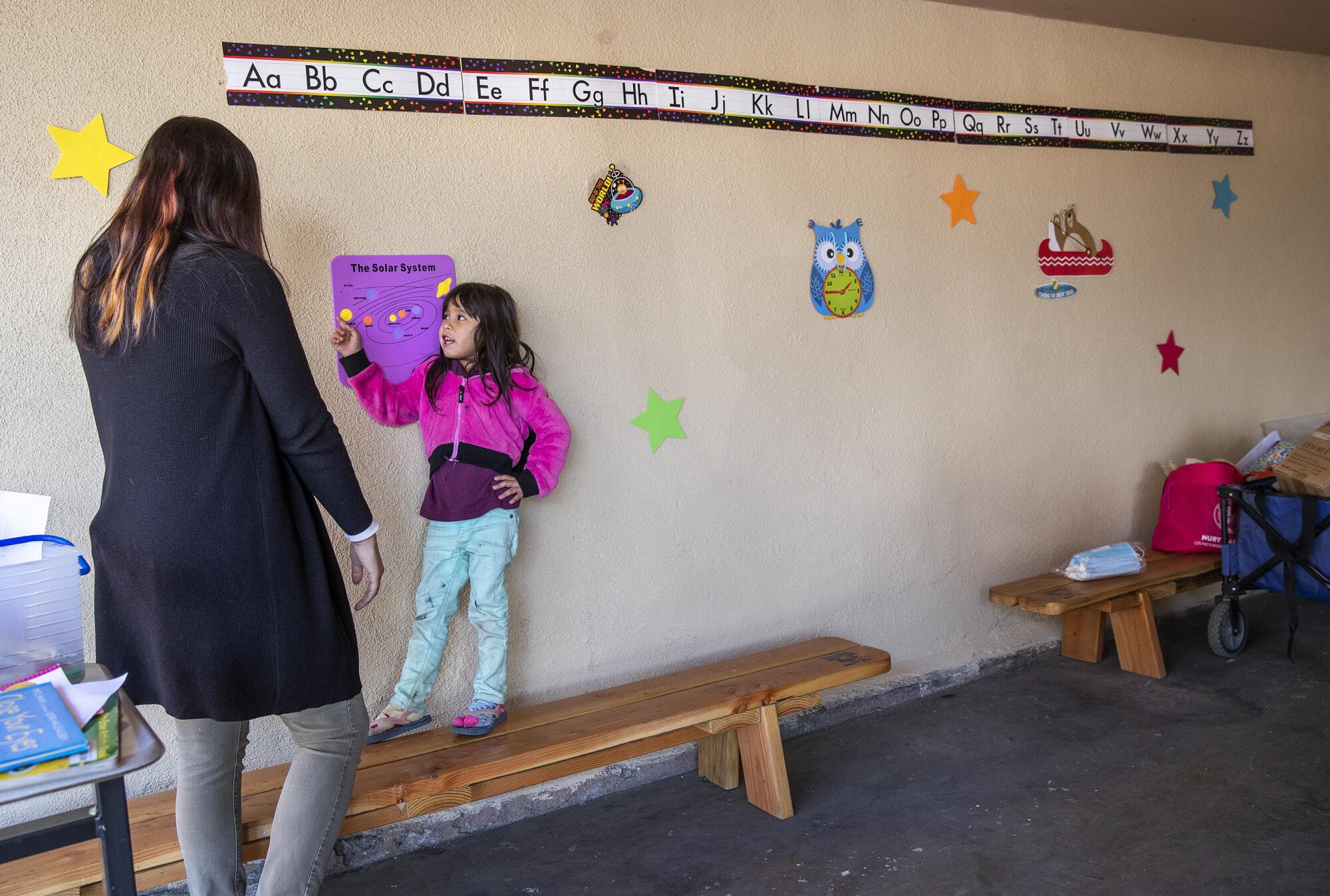
The morning starts with hungry kids
Gerch is one of four instructors circulating around the carport, helping kids log on to their LAUSD-issued Chromebooks and tablets for 9 a.m. classes at several different schools.
But they are hungry.
“Can I have a snack?” a kindergarten boy seated at a low table — because the desks are too tall for him — asks Gerch.
“We don’t have snacks yet, but if you can sit and listen to your teacher for the next 10 minutes, I can bring you a snack,” she replies.
A moment later, a small girl runs up to Gerch and also asks for a snack.
“Give me 10 minutes, OK?” Gerch says, smiling.
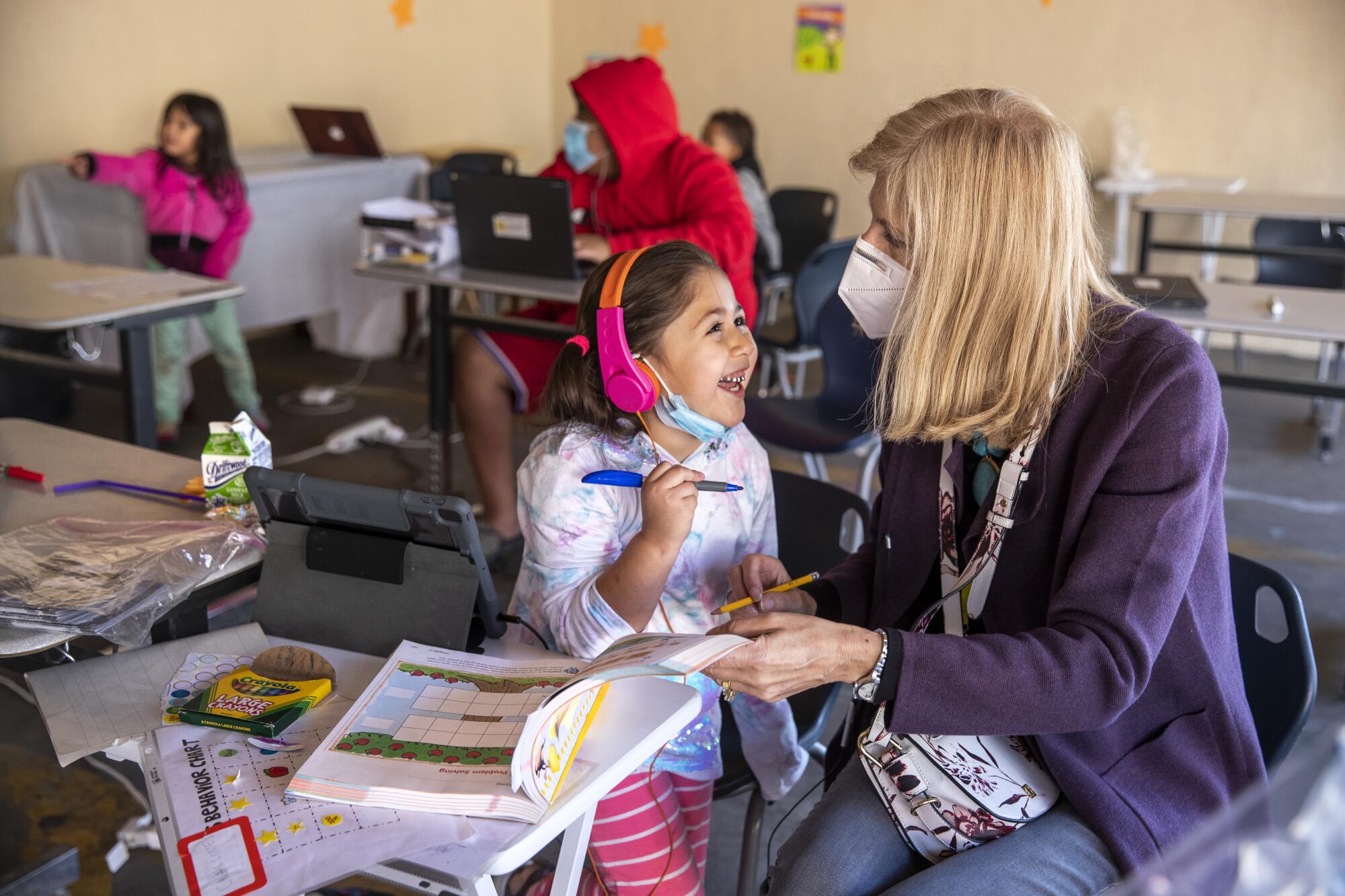
The pod pupils have come to rely on the morning snacks — on this day, granola bars — and LAUSD-issued bag lunches. The district has established 60 “grab and go” centers that provide two meals each day to students and families, but homeless parents especially may not have access to transportation to get to those centers, Gerch said.
Some teachers have complained to the School on Wheels tutors, saying that students are not allowed to eat while they’re on camera.
“That’s a challenge,” Gerch said. “Our kids are hungry. Sometimes we can’t get them to sit unless we give them food.” So now while they eat, they turn off their cameras.
The younger kids have the hardest time focusing, so tutors will usually sit with them until the learning pod is over at noon. The older students who live in the motel tend to work independently in the adjacent courtyard or in their rooms, and come downstairs only to grab lunch.
Gov. Gavin Newsom has announced a stay-at-home order affecting most of California.
At the back of the class, tutor Ian Chan is working with an energetic, curly haired kindergartener. The teacher has asked the boy to hold up his phonics worksheet to show his progress to his online teacher, but he is busy coloring — so Chan gently redirects him to the worksheet.
“What comes after H?” Chan asks. The kindergartener draws a tiny “I” on the paper, looking up at his tutor for approval.
“Cool,” says Chan, who runs the pod with Gerch.
School on Wheels keeps a spreadsheet of all the students: their teachers’ names, class schedules and any specialized learning services they are supposed to receive. The nonprofit is still trying to get the kids’ grades, which would give the tutors a better idea of how they are performing academically.
“Many of our kids are behind in grade level because of all the challenges of homelessness, and they’re falling even further behind because it’s so hard to stay engaged in online learning,” Gerch said.
The tutors have seen some progress, though. When the school year began in August, the youngest kids could hardly sit still and would run in circles around the carport. Now they’ve established a rhythm with the tutor and know that they’re expected to pay attention for as long as they can.
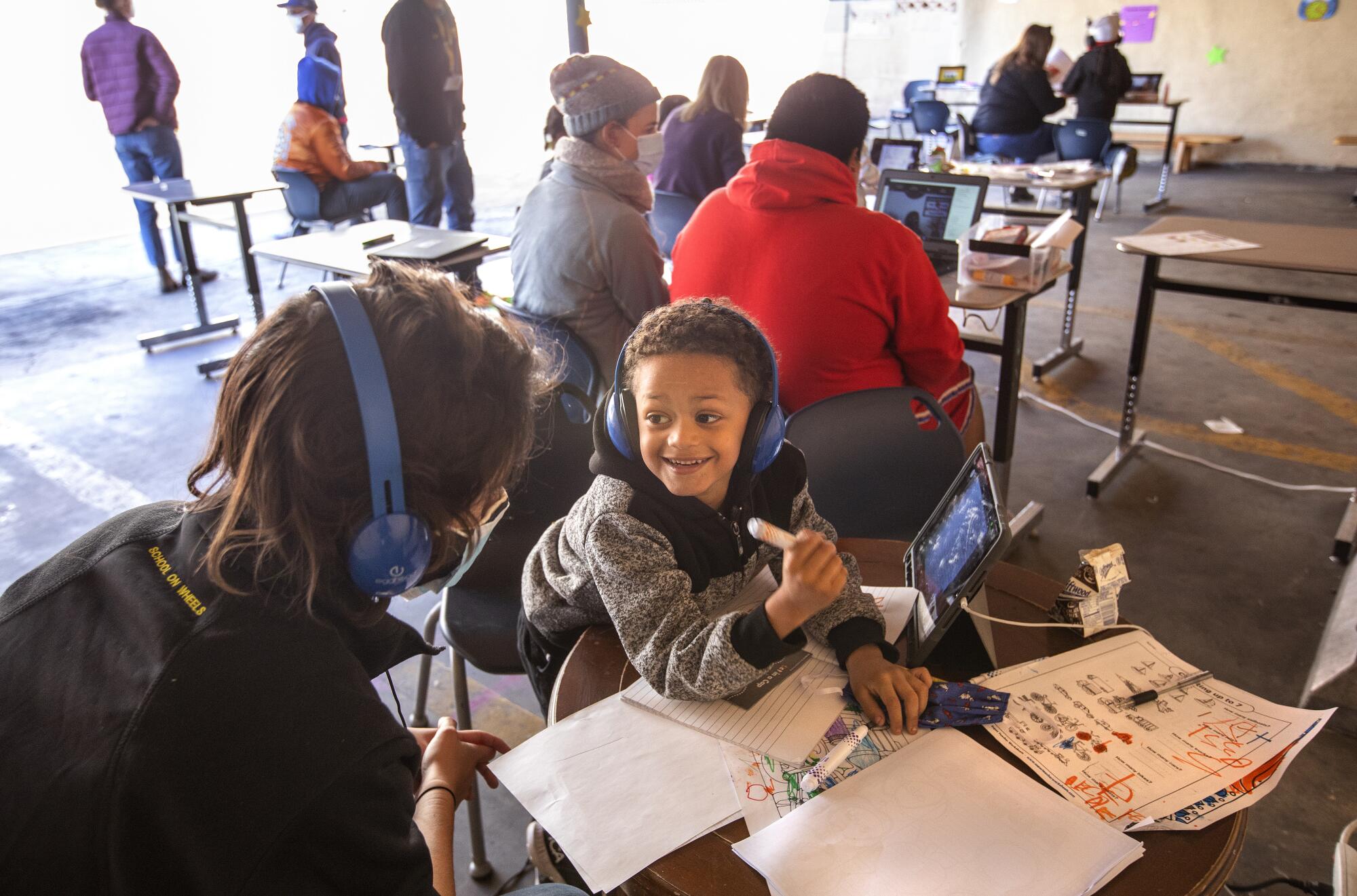
The number of students who join the pod is in constant flux. Sometimes kids will be with another parent, or they aren’t feeling well.
Erica Richardson, a mother sheltering in the motel with her two children, said that the learning pod has created a sense of stability for her 9- and 12-year-old boys. Internet connection is unreliable at the Hyland, she said, and it’s sometimes out for an entire day. She knows that her sons will at least get the help they need on Mondays and Tuesdays.
Richardson moved into the motel over a year ago after losing her job as a janitor at a homeless shelter. The pandemic and single parenting have made it all but impossible for her to find work. She doesn’t want to leave the boys alone at the motel.
Her younger son was bullied at school, so he was initially anxious about the pod. But now he looks forward to being around the other kids. “Down here, he’s like everybody else,” Richardson said.
Overwhelming needs
Because they only meet with students twice a week, the tutors try to make their hours count, zeroing in on the most pressing academic needs. Like first responders, they render educational aid without knowing much about a student’s past.
Earlier in the school year, a tutor told Gerch that a seventh-grader was having trouble reading. So the next time he came to the pod, she sat next to him while his class was reading passages from a history textbook.
“How does it feel to read this?” Gerch asked. “Hard? Easy?”
“I never learned how to read,” he replied.
It was hard for Gerch to fathom a student getting to middle school without being able to read. She asked another tutor to read the passages to him so he could answer the questions along with his classmates.
Gerch brought the student third grade-level worksheets. Though he at first seemed confident in his ability to complete them, even those were too advanced.
Nikki Perez, project manager with Kids First, walks with an English language learner around the edge of the carport, its floor scattered with food wrappers and markers. She asks the 4-year-old to name the colors of the stars taped to the walls.
“Este?” Perez asks, pointing to a star.
“Blue!” the girl shouts.
“Este?” Perez says, pointing to another.
“Amarillo!” — Spanish for “yellow” — says the girl, jumping up and down.
The volunteers — a grad student, a former elementary school teacher and a massage therapist among them — help students gather their things and sanitize their hands before classes end around lunchtime.
“It’s time to go!” one boy yells. A girl grabs her pink scooter from the courtyard and shows it off to the other kids.
The students take their time leaving, chatting with each other and the tutors. It’s just a short walk to their motel rooms.
- Share via
Watch L.A. Times Today at 7 p.m. on Spectrum News 1 on Channel 1 or live stream on the Spectrum News App. Palos Verdes Peninsula and Orange County viewers can watch on Cox Systems on channel 99.
More to Read
Sign up for Essential California
The most important California stories and recommendations in your inbox every morning.
You may occasionally receive promotional content from the Los Angeles Times.

